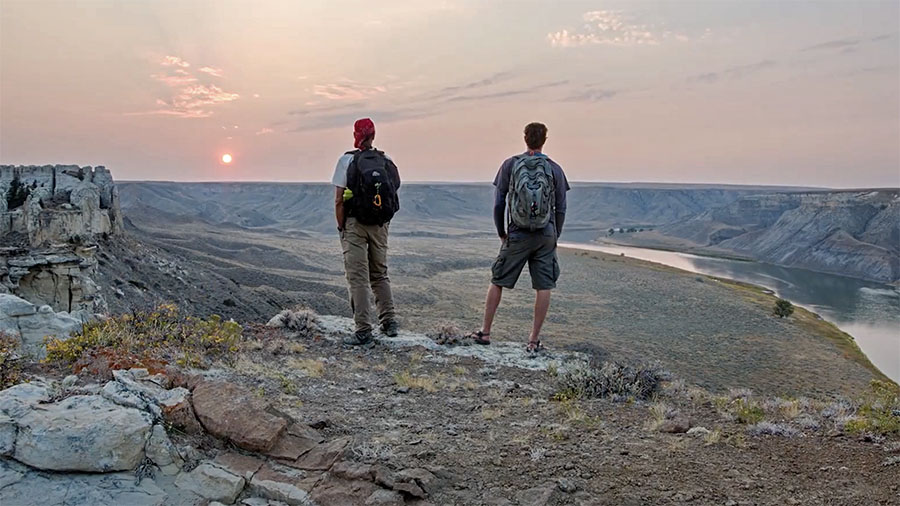A new light is shining in the West as the outdoor recreation industry returns from the long Independence Day holiday weekend, mainly due to a very positive two weeks on the Public Lands policy front. It is refreshing to see the work the Outdoor Recreation Roundtable (ORR) and its 50 national members have done to develop and maintain a bipartisan approach to issues that threaten to impact access, creation and expansion of Public Lands in the U.S.
While several trade associations and outdoor recreation companies were on the attack over a provision that Senator Mike Lee (R-UT) attempted to insert in the One Big Beautiful Bill, it is now clear that that effort was seen by several U.S. House members and U.S. Senators as a “poison pill” designed to scuttle support for the overall Bill. If not for the Senate Parliamentarian rejecting the provision, the overall Bill would not have passed, as Republican members balked at Lee’s efforts.
“From the beginning, ORR has stood firmly on shared, bipartisan principles: protecting access to Public Lands and waters for outdoor recreation, investing in infrastructure, and securing long-term funding for sustainable growth,” said ORR President Jessica Turner. “While we stand ready to work on housing issues that need to be addressed with Congress and the administration, budget reconciliation was the wrong vehicle for deciding the fate of America’s Public Lands and the $1.2 trillion recreation economy.”
Turner’s reference to “housing issues” related to Lee pushing for the sell-off of land owned by the U.S. Government in two-square-mile parcels within five miles of a “population center“ to free up government land for building low-income housing. The maps that were circulated describing a “visual representation“ of the earlier Lee plan for 2.2 million to 3.3 million acres of Public Lands that were designated for sell-off were clearly used as a vehicle to stir emotion and opposition to the Lee effort but failed to tell the whole story.
ORR took a more pragmatic approach and its members worked the phones in DC to solidify the bipartisan effort.
“ORR and our members spanning the entire outdoor recreation industry are uniquely positioned to forge innovative, bipartisan solutions to issues impacting our Public Lands — from housing for our workforce, to funding needed infrastructure, to supporting gateway communities — and keeping Public Lands and waters accessible and outdoor recreation thriving for generations to come will remain the backbone of this work,“ Turner said.
In addition to the four Republican senators who opposed the plan, five House Republicans stated that the land sell-off was a “poison pill“ that would cost them their votes for the package, according to a report from The Wall Street Journal. The Journal said opponents in the House included Representative Ryan Zinke, a Republican from Montana, who led the Interior Department during President Trump’s first term.
The Journal said Donald Trump, Jr., the president’s eldest son and an avid hunter and outdoorsman, had been publicly silent on Lee’s plan while it was under consideration, but once it failed, he wrote on X (formerly Twitter) that the proposal’s withdrawal was a “huge win for our Public Lands!”
Trump Jr. was reportedly a key advocate for Public Lands during the first Trump Administration and was credited with lobbying his father heavily for the Great American Outdoors Act (GAOA), signed into law on August 4, 2020.
REI, OIA, the NSSF, and a wide range of other industry groups hailed the passage of the Great American Outdoors Act, which passed by a vote of 310 to 107, and approves $900 million in annual funding for the Land and Water Conservation Fund (LWCF) and was expected to address the nearly $20 billion deferred maintenance backlog on federal Public Lands.
Unfortunately, REI has withdrawn from working with this new Administration after its CEO apologized to its co-op members for applauding Trump’s Secretary of the Interior pick.
The GAOA was said at the time to be the largest investment in America’s national parks and public lands in history and the most significant development in conservation policy since Teddy Roosevelt. However, the outdoor industry (or the Trump Administration) no longer discusses it much, except to acknowledge its passage.
Explore Act Implementation
Before the passage of the One Big Beautiful Bill sans the Public Lands sell-off, Secretary of the Interior Doug Burgum signed a Secretarial Order on June 25, 2025, officially implementing the Expanding Public Lands Outdoor Recreation Experiences (EXPLORE) Act. The action is said to mark a historic step forward in expanding access to outdoor recreation and modernizing federal recreation policy nationwide.
ORR’s Turner reportedly joined members and partners for the signing ceremony of the Secretarial Order.
“This showcases the effectiveness of ORR bringing the industry together and the leadership of our members to accomplish real results and solutions for modernizing and improving outdoor access and infrastructure,“ said Turner. “This is what pragmatic and bipartisan solutions look like, and we again thank the Secretary and the EXPLORE Act sponsors. By laying out a coordinated implementation plan utilizing the Federal Interagency Council on Outdoor Recreation, the Department is honoring the bipartisan spirit of the EXPLORE Act and ensuring that more Americans will have access to the outdoors in ways that are sustainable, inclusive, and economically impactful.”
The EXPLORE Act was initially signed in early January 2025 by the Biden Administration after unanimous passage in both the U.S. House and Senate, led by Senators Joe Manchin (D-WV) and John Barrasso (R-WY), joined by U.S. House Representatives Bruce Westerman (R-AR) and Raúl Grijalva (D-AZ).
“This Order is intended to improve the internal management of the Department and ensure compliance with the EXPLORE Act,“ Secretary Burgum wrote on June 25.
“We commend Secretary Burgum for implementing the EXPLORE Act. This milestone will have a lasting impact on the continued growth of the $1.2 trillion outdoor recreation economy, catalyzing critical reforms that expand access to public lands and waters, streamline permitting and modernize the way recreation is managed across federal agencies,“ said Frank Hugelmeyer, president and CEO, National Marine Manufacturers Association (NMMA), an ORR member organization.
“NMMA is proud to celebrate this historic moment and the bipartisan leadership that made it possible,” Hugelemeyer continued. “We look forward to working closely with Secretary Burgum and the Trump administration to further expand access to public waters and recreational opportunities for millions of Americans.”
The legislation is said to represent one of the most significant recreation policy packages in recent history.
Key provisions of the EXPLORE Act, as outlined by the NMMA, include:
- Improves public access to federal lands and waters for outdoor recreation;
- Streamlines permitting processes for small recreation businesses;
- Modernizes the technology used by federal land management agencies;
- Invests in the restoration and enhancement of recreation infrastructure; and
- Increases stakeholder engagement through meaningful coordination and/or consultation with gateway communities, Indian Tribes, state and local governments, veterans’ organizations and other relevant stakeholders.
The EXPLORE Act highlights the crucial role that outdoor recreation plays in the U.S. economy and lays a solid foundation for future recreation-focused legislation.
Go here to read the entirety of the Secretary’s Order.
Department of the Interior Patriot Program
The wins for the outdoor recreation market continued on July 3 with Secretary Burgum’s launch of the Patriot Program, described as a three-year pilot initiative dedicated to restoring and revitalizing America’s Public Lands in honor of the Nation’s 250th birthday.
“Through this program, the Department of the Interior will engage in a public-private partnership to invest $250 million in critical infrastructure, preservation and public access projects at iconic sites to restore America’s greatness,“ the Interior Department’s press office noted.
The Department stated that every federal dollar invested in the Patriot Program is expected to be matched by 50 percent in private funding or in-kind contributions, leveraging philanthropic support to amplify impacts, increase efficiency, and maximize the impact of taxpayer resources.
“The scope of the program includes historic preservation, masonry repairs, wildland fuel reduction, trail maintenance and improved access to iconic sites. To do this, the program will help ‘Make America Skilled Again‘ by engaging youth and young adults in meaningful projects, provide hands-on training in skilled trades and foster pathways to sustainable career path all while rebuilding pride in American workmanship,“ the department noted.
Make America Beautiful Again
To extend the commitment to outdoor recreation, U.S. President Donald Trump signed an Executive Order on July 3 establishing the Make America Beautiful Again (MABA) Commission to conserve America’s lands and waters, cut red tape, and drive conservation and economic growth.
The MABA Commission will reportedly be chaired by Secretary Burgum and comprised of members of the Trump Administration.
“Guided by our Nation’s rich history, the MABA Commission will work to expand access to recreation for outdoorsmen, hunters, anglers, hikers, bikers, climbers, skiers, runners, and all Americans seeking to spend time in nature,“ the White House said in a Thursday media statement. “The MABA Commission is tasked with expanding access to Public Lands and waters for recreation and incentivizing voluntary conservation efforts. Using gold-standard science, the MABA Commission will promote active forest management and responsible stewardship of our Public Lands, while reducing bureaucratic delays that hinder effective environmental management and put our forests and rural communities at risk.”
Key Components
All Federal land management agencies, as defined by 16 U.S.C. 6801(3), shall, to the extent practicable, ensure that their policies:
- Promote responsible stewardship of natural resources while driving economic growth;
- Expand access to Public Lands and waters for recreation, hunting, and fishing;
- Encourage responsible, voluntary conservation efforts;
- Cut bureaucratic delays that hinder effective environmental management; and
- Recover America’s fish and wildlife populations through proactive, voluntary, on-the-ground collaborative conservation efforts.
Expanding Access to Public Lands
The statement said that President Trump wants to preserve America’s natural beauty and expand outdoor recreation for future generations. “As the Roosevelt Arch at Yellowstone National Park states, America’s Public Lands are ‘for the benefit and enjoyment of the people.‘ Therefore, the MABA Commission will work to expand access to America’s natural wonders for the enjoyment of the American people.”
The White House reiterated the oft-cited metrics that the outdoor recreation economy creates $1.2 trillion in economic output and supports five million jobs, but then decided to take a shot at the Biden Administration, saying it “unnecessarily restricted outdoorsmen’s access to Public Lands and deprived them of the ability to responsibly hunt and fish in certain areas.“ The White House claimed that “years of mismanagement have unnecessarily reduced public access to and enjoyment of outdoor recreational areas.”
Conserving American Treasures
The statement went on to suggest that the MABA Commission will build on the legacy of conservative conservationists, such as President Theodore Roosevelt, and protect the Nation’s natural treasures.
“During President Trump’s first term in office, his Administration recovered more endangered or threatened species than any other administration in its first term,“ the statement read. In addition to the Great American Outdoors Act signed during Trump’s first term, the White House also stressed that his Administration designated 1.3 million new acres of wilderness, added 1,645 miles of new trails to the National Recreational Trails System, and expanded hunting and fishing opportunities across more than 2.3 million acres of land.
“President Trump has worked to protect American industries while maintaining standards that allow Americans to have among the cleanest air and water in the world,“ the statement concluded.
Go HERE to read the entirety of the MABA Executive Order.
On the same day, Trump issued another Executive Order focused on improving the National Parks.
Making America Great Again by Improving Our National Parks
This Executive Order established it is the policy of the Trump Administration to preserve National Park opportunities for American families in future generations by increasing entry fees for foreign tourists, improving affordability for United States residents, and expanding opportunities to enjoy America’s splendid national treasures. The crux of the E.O. is marketing the parks to attract more international visitors and raising fees for nonresidents to cover the costs of the program.
The E.O. requires Secretary Burgum to develop a strategy to increase revenue and improve the recreational experience at national parks by appropriately increasing entrance fees and recreation pass fees for nonresidents in areas of the National Park System that charge entrance fees or recreation pass fees as defined in 16 U.S.C. 6801. Additionally, to the extent consistent with applicable law, the Interior Secretary, working with the Secretary of Agriculture as appropriate, is expected to take steps to increase the prices at which the America the Beautiful Pass — the National Parks and Federal Recreational Lands Pass — and any site-specific agency or regional multi-entity passes are sold to nonresidents.
(b) The Secretary of the Interior shall use any increased fee revenue generated to improve the infrastructure of, or otherwise enhance enjoyment of or access to, America’s Federal recreational areas, consistent with 16 U.S.C. 6807.
(c) The Secretary of the Interior, working with the Secretary of Agriculture as appropriate, shall take steps to improve services and affordability for United States residents visiting national parks, as consistent with applicable law.
(d) The Secretary of the Interior, working with the Secretary of State, shall work to encourage international tourism to America’s national parks and outdoor recreation areas, and especially wider utilization of America’s many such areas that may be underutilized.
(e) The Secretary of the Interior shall review the maintenance backlog within the National Park Service and take all appropriate action to fully implement the National Parks and Public Land Legacy Restoration Fund established in the Great American Outdoors Act (Public Law 116-152), invest in the infrastructure of national parks, and increase visitor capacity to allow more Americans to visit national parks.
(f) The Secretary of the Interior shall review all of the Department of the Interior’s rules and policies related to public use of national parks and take actions consistent with applicable law to ensure that the National Park Service manages national parks consistent with the policy of this order. The Secretary of the Interior shall review all of the Department’s recreational access rules and take steps to rescind any that unnecessarily restrict recreation in national parks. In conducting this review, the Secretary of the Interior shall especially scrutinize all recreational access rules or other restrictions promulgated or enacted during the prior administration. The Secretary of the Interior shall take appropriate actions to grant American residents preferential treatment with respect to any remaining recreational access rules, including permitting or lottery rules, consistent with applicable law.
Unfortunately, the Presidential Memorandum of January 12, 2017 (Promoting Diversity and Inclusion in Our National Parks, National Forests, and Other Public Lands and Waters), which Barack Obama signed in the waning days of his second term, was also “hereby revoked“ as part of the E.O.
Go HERE to read the entirety of the National Parks Executive Order.
Image courtesy U.S. Department of Interior, Bureau of Land Management
















